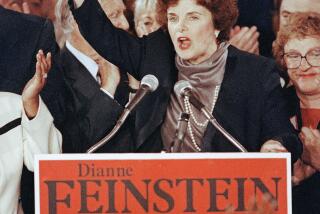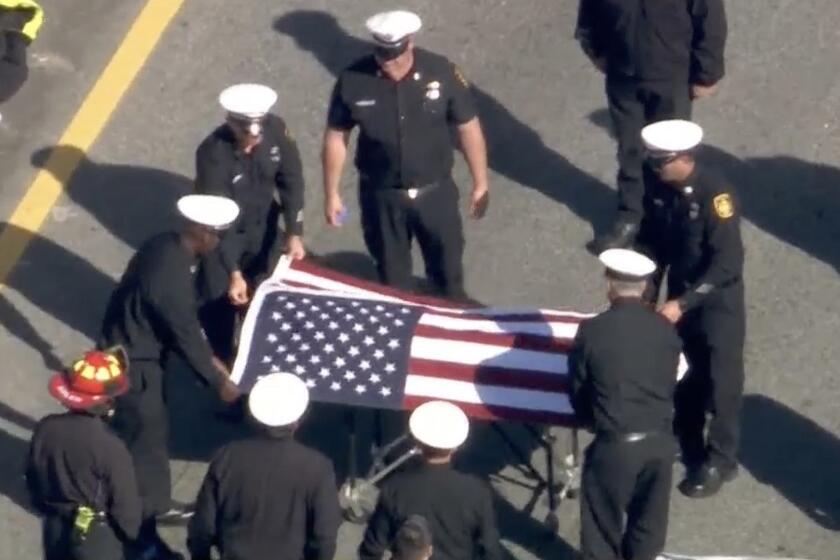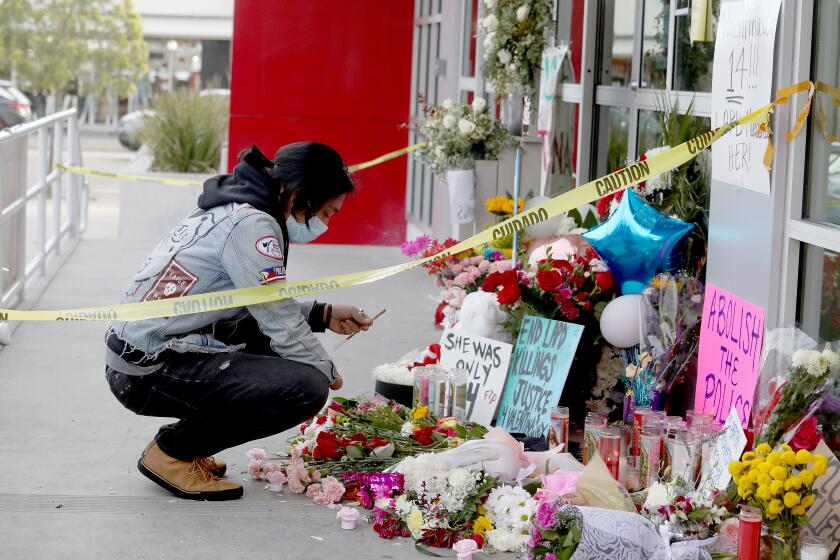A state in search of a leader
In the end, the numbers were almost identical, give or take a billion. Last week’s election decided measures meant to diminish California’s $24-billion deficit. And just about 24% of voters turned out to do the deciding. Woeful turnout, woeful state.
For a place that likes to feel that it is always bounding down the freeway ahead of everyone else, there was an audible gear-grinding last week, as the engine that is California threw a rod and skittered to the side of the road.
That could be good, if you believe that state and local governments have spent too much they didn’t have and wasted the rest. It could be bad, if you value the programs about to be cut or are one of those whose livelihood is under the guillotine.
In any case, Tuesday night saw California’s elected leaders, Gov. Arnold Schwarzenegger and key legislators, and its most successful advocacy groups, teachers and firefighters, brushed aside by voters on state measures. Locally, Mayor Antonio Villaraigosa and Police Chief William J. Bratton’s desires were ignored. Wednesday morning dawned like a Zen riddle: If there are no followers, are there any leaders?
The answer, from two who would know, is definitive: No.
Apart from money, of which they both have much, Eli Broad and Peter Ueberroth inhabit different parts of the spectrum. Broad is a Democrat from Los Angeles, Ueberroth a Republican from Orange County. Both, however, made their names on matters of high civic involvement: Broad with his art and education pursuits and his championing of a vibrant downtown, Ueberroth as he yanked the Olympic movement back to success in 1984 and later took charge of a post-riot rebuilding project.
Each, with a slightly different take, sees the state they love foundering unless someone -- preferably a lot of someones -- steps in to lead. By that they mean speaking bluntly and honestly about the state’s straits and guiding it to solid ground.
“When you have a crisis, everyone must grab a laboring oar toward a solution, or else you never go anywhere,” said Ueberroth. “I think that’s what’s happened. The public has realized that everybody’s got an oar, but nobody’s getting into the boat and going through difficult seas and getting to the other side.”
Broad levels different criticisms of city and state officials. By contrast to places like New York and Chicago, he said, “I have not seen the courageous public officeholders in this city . . . who are willing to make courageous decisions that are not based on the politics of the next office they are looking for.”
And at the state level? “We had great years of great prosperity and we didn’t have the leadership in those years to say, ‘Wait a minute, we can’t spend all that money.’ ”
A recurring argument centers on whether California is ungovernable. But in the not-too-distant past, under not-too-different circumstances, it was governed with roundhouse heft. In 1991, when he became governor, Republican Pete Wilson was faced with a $14-billion deficit -- at the time one-third of the state’s general fund. The most potent Democrat in the state was Assembly Speaker Willie Brown of San Francisco. In bouts of negotiating that one bystander said resembled an Ali-Frazier match, the two came to a deal that basically split the difference between taxes and program cuts.
Each took tremendous heat from his own party and opponents. Wilson’s approval rating fell at one point into the low teens -- for perspective, that’s twice as bad as Schwarzenegger’s current low ratings. But the state ultimately rebounded. Which was, after all, the point.
“It wasn’t junior high politics,” said one who saw the duo up close but declined to speak by name because of continuing political relationships. “It was two big titans who knew their policy stuff back and forth.”
Neither Broad nor Ueberroth has much use for dumping on specific individuals, although Broad did send a firm message to Villaraigosa, who is pondering a run for governor even before his second term begins:
“Here we have a mayor who’s going to start his next term in, what, 39 days? I hope his next term is one in which he’s not running for office and faces up to the big issues facing the city.”
What they are talking about is almost a cultural shift away from the politics of now.
“Now, because there is no trust, if someone makes a decision, everyone gets on talk shows and criticizes. There’s a paralysis of courage,” said Ueberroth.
In their view, pulling California out of the abyss will require the joint efforts of residents, the political class and the private sector. The absence of the latter in civic matters has been notable, according to both men.
In prior crises, like the post-riot rebuilding effort of the early 1990s, local companies jumped in. But many of the civic-minded local institutions -- Carter Hawley Hale, the corporate parent of the Broadway stores; United California Bank; Hughes Aircraft -- no longer exist.
“The void has to be filled with other industries which we have here -- entertainment, fashion, biotech,” Broad said.
And part of the void has to be filled by a greater interest among voters -- particularly those who didn’t show up Tuesday -- and their elected representatives.
“Everyone’s going to have to suffer to make the state prosper again,” said Ueberroth, adding that “the left and the right have to throw out the rhetoric and link arms and try to get us going as quickly as we can . . . realizing that there will be some major suffering before we get out of the woods.”
Asked if they are confident that new leaders will emerge, both men sounded as if they were, but only guardedly so.
“Hopefully, some leadership will come out of it,” said Broad, referring to California’s fiscal calamities. “It often does, out of crisis.”
Each Sunday, The Week examines one or more major stories and their implications. Previous editions of The Week are archived at latimes.com/theweek.
More to Read
Start your day right
Sign up for Essential California for news, features and recommendations from the L.A. Times and beyond in your inbox six days a week.
You may occasionally receive promotional content from the Los Angeles Times.







